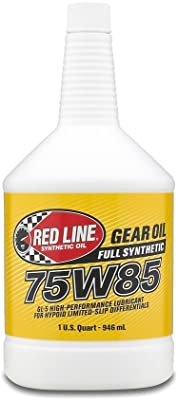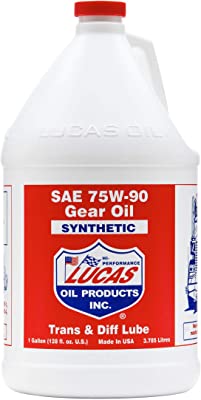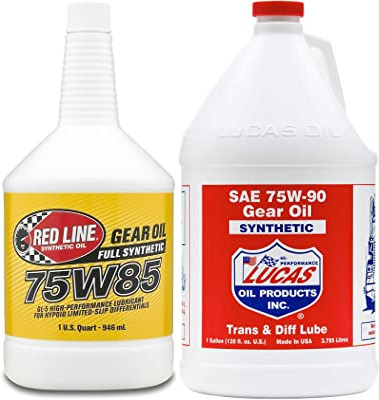75w85 Vs. 75w90 Main Difference: 75w90 gear lubricant oil has a more consistent thickness. It gets thicker when introduced to heat and thinner when exposed to a sudden drop in temperature. On the other hand, the 75w85 gear lubricant oil is a fully synthetic Gear Oils that possesses high performance with top-notch base oils.
The comparison of 75w85 and 75w90 is far-fetched when it comes to the real world. The difference between these two oils is very small and can be seen under precise and thorough tests in a lab. However, addressing a big difference in the real world would be quite an undertaking.
75w85 Vs 75w90 In a Table
| Particular | 75w85 | 75w90 |
| Definition | 75w85 has a more consistent thickness. | 75w90 oil high performance with top-notch base oils. |
| Synthetic oil | Super Tech Full Synthetic Gear Oil. | Super Tech Full Synthetic Gear Oil |
| Type | The base oil is much thicker | The base oil is much heavier |
| Provide | 75w85 provide superior gear protection | 75w90 provides high resistance to thermal breakdown. |
| Prevent | Premium extreme pressure additives and rust preventatives | Help prevent foaming, rust, and corrosion. |
| Designed | It is a protection device for Hypoid gears, manual transmissions, gearboxes, passenger cars, and light trucks. | It is formulated for the high-performance needs of all sterndrives and outboard motors. |
| Used | In cold weather, it can be difficult for a car to maintain its stability. | It is more suitable to use in cold weather |
| Recommended | For use where API is simplified. | Recommended where API GL-5 and MT-1, MACK GO-J, SAE J2360, and MIL-PRF-2105E are specified. |
| Viscosity | 115 | 105 |
| Price | The 75w85 price is around 1 quart $15-$20. | The 75w90 price is around 1 quart $10-$15. |
What is 75w85?

SAE class 75w85 transmission oils are made of the highest quality synthetic base oils. This makes them excellent for use all year round, as they possess outstanding viscosity-temperature behavior and meet the requirements of API GL-4 (international specification). Additionally, 75w85 oil is excellently suited for manual transmissions which require an API GL-4+ level according to their OEM. The “75w85” SAE classifies the transmission oil as being suitable for cold temperatures. This means that it is able to flow smoothly and freely at all temperature ranges. The value before the “W” (Water) indicates how easy the oil is to flow: a number between -40°C and +40°C. The number “85” refers to the kinematic viscosity of this type of oil: 11.0 – 13.4 mm²/s, which makes it thick but nonetheless available at any temperature range.
What is 75w90?

75w90 is a fully synthetic gear lubricant designed to meet the API GL-5 performance level. It is formulated from synthetic base oils and an advanced additive system, providing excellent load-carrying capability where extreme pressures and shock loading are expected. The oil also meets the requirements of the IATSE conformity testing protocol.
The SAE class for which transmission oil must have characteristic properties is 75w90. This classification is made by the Society of Automotive Engineers, and it specifies how the flow properties of oil at certain temperatures are important in this context. Gear oils with 75w90 remain flowable up to -40°C. The number “90” refers to the kinematic viscosity of the gear oil at 100 °C; this corresponds to a shear stability range that includes 13.5-18.4 mm²/s! The high shear stability means that enraged or high-torque gearboxes can be used without fear of failure.
75w85 Vs 75w90: Major Differences
Designed for the winter season
One of the main concerns for an ideal gear oil is its ability to function in cold weather. The oil is a liquid that is very exposed to getting thicker and losing its natural viscosity due to the cold temperature. But with 75w 90, it sustains its usual texture with an intact flow which allows you to use it throughout the years in every weather condition! Additionally, 75w 85 has artificial intelligence designed into it so that it adjusts itself according to changing weather facts! In summer and under the scorching sun, it gets thicker not preventing agents from melting and leaking; on the other hand, in winter when everything seems frozen 75w85 becomes thinner for effortless easy flow.
Excellent Thermal Stability
With both 75w 85 and 75w 90 gear oils, you can shake off your worry and let them do the work. These products are designed to remain thermally stable under extreme pressure – a sudden acceleration, changing lanes, or reverse; in short the on and off the start of the engine can spark the possibility of a severe system failure.
Protect from rust and corrosion
75w 90 gear oil is different from other gear oils because it focuses on lubrication. This helps to protect the gears and reduce wear and rust. It also ensures that the differential doesn’t chatter. In addition, 75w 85 Gear oil contains no complementary factors- only lubrication! This results in an extended life for all of your interior engine components, as well as easier movement through limited-slip Differentials.
Compatible with lubricant
75w 90 gear oil is one of the best available in the market when it comes to lubrication. It is compatible with other conventional gear lubricants, unlike any other gear oil that you may be familiar with. Additionally, it works just as well as traditional engine oils and even better! When it comes to lubrication there is no better option than 75w 85 which provides maximum protection against rust and corrosion.
Recommendation
75w 90 gear oil has been a regular recommendation for differentials that use a manual transmission. It can work in full swing with the non-synchronized manual transmission where API GL-5 or API FL-4 fluid is specified. 75w 85 gear oil is designed to provide the ultimate solution for all your lubrication issues. It’s made with exceptional drivetrain security and innovative manufacturing techniques, ensuring perfect results every time.
Viscosity
SAE 75w85 gear oils are based on synthetic oil, meaning they need more frequent oil adjustments. They have a thicker consistency at lower temperatures which may also affect their production greatly. Additionally, SAE 75W-90 gear oils are preserved with a constant thickness or viscosity. This allows for an even distribution of heat and pressure across the entire barrel during combustion, resulting in greater fuel efficiency and longevity.
Additives
Our 75W-90 gear oil is an extremely sleek, non-foaming, and reliable gear oil to manage heavy-duty applications or high efficiency. On the other hand, the 75w85 gear oil mixture is strengthened with specific anti-wear and lubricating agents to manage wear and tear and special heat control additives.
75w85 is Best for Regular Usage
You may be interested in our SAE Viscosity 75W-85 API GL-4 automotive gear oil for passenger cars and automotive applications including hypoid gears operating under moderate to severe conditions. This engine oil is formulated with a high degree of viscosity, making it ideal for driving on thick surfaces or working in difficult weather conditions.
75w90 is Best for Use in Cold Weather
The 75W-90 gear oil is used under extreme pressure conditions and is recommended for limited-slip differentials and for use in colder climates. It can be used in heavy-duty manual transmissions, final drives, and axles. In cold weather, it will not affect the high film left by the Gear Oils at low temperatures.
FAQ
What’s the difference between 75W90 and 75W85?
Both 75w 85 and 75w 90 are considered gear lubes. They both offer the same pros, but there are some key differences between them. For example, 75w 85 is considered to be a better gear oil because it offers better mileage than its predecessor,75w 90. However, with the naked eye or without any strict test both these gear oils provide almost the same benefits and drawbacks.
Are they interchangeable?
Yes, 75w 85 was used instead of 75w 90. They are interchangeable and will most definitely be replaced without causing any harm.
Is Thicker diff oil better?
If you’re looking for additional power and stability when turning, using a thicker diff oil may be the way to go. However, if you need more power from the front or back of the car, using a thicker oil would be better.
Final Words
The rating of 7w 85 is 4.9 stars out of 5, but even with the same sort of output the rating for 75w 90 differs just by 0.1 stars owing to the average rating of 4.8 stars out of 5. There is no room for great loss or regret since they both are identical. Feel free to choose anyone without much hesitation.
Read also:
- Transfer Case Fluid Vs Transmission Fluid (With Table)
- Seafoam Vs Lucas (With Comparison Table)
- Purolator Boss Vs Mobil 1- Which Is The Best Oil Filter?
- Monstaliner Vs Raptor Liner – What Are The Major Differences?
- Bg 44k Vs Seafoam – What Are The Main Differences?
- Krown Vs Fluid Film: Understand Which Is Top Picks

